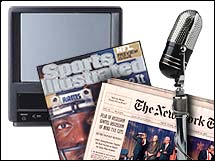Old media isn't deadThere's no better time to pen an ode to TV, radio and print than on Valentine's Day. Sure, new media's sexy. But old media isn't going away.NEW YORK (CNNMoney.com) -- This Valentine's Day, I've decided to give a big sloppy wet kiss to something that really needs some love: old media. Old media, in case you haven't heard, won't be with us much longer. Radio, TV, newspapers and magazines are dying.
By this time next year (if not sooner!) there'll be no need for the old media guard anymore because everyone will be only reading blogs and listening to podcasts -- when they're not busy creating their own of course. The TV networks and record labels will be obsolete because people will find all the entertainment they need on YouTube, MySpace and iTunes. Please. I don't know about you. But I'm getting tired of reading all the old media eulogies. Now don't get me wrong. I'm not suggesting that "new media" is all hype. I get it. I watch YouTube, buy nearly all my music from iTunes and love to find out from PerezHilton.com who the latest celeb to check into rehab is. Heck, I write for an online news site. Media giants, like Time Warner (Charts), the one that pays my salary, have to change. But guess what? They are. Speaking at a media conference in New York last week, News Corp. (Charts) chairman and chief executive officer Rupert Murdoch said that despite all the doom and gloom talk about newspapers, he still is a fan of the publishing business and has no plans to sell his newspaper division. Murdoch conceded that the newspaper business needs to do a better job online but he does not think papers are going away. It's worth noting that News Corp. also owns MySpace. So old media can adapt. News Corp. is just one example. The other media giants like Walt Disney (Charts), CBS (Charts), Viacom (Charts) and yes, Time Warner, are also aggressively expanding their digital media presence. "How long have we been hearing about newspapers going out of business?" asks Robert Raciti, senior vice president of global media and communications with GE Commercial Finance. "Old media is not going away. We all get it." Raciti works closely with GE-owned NBC Universal on the unit's digital strategy. He said that GE, as well as other media companies, realize they must invest even more online in order to compete with upstarts like YouTube. But this doesn't mean that old media is going to be completely usurped by the likes of YouTube. That notion is just silly. Consider a few questions. If old media really was on death's door, then why are new media companies so eager to cozy up to established media giants? Why does YouTube, now owned by Google (Charts), have a partnership with CBS? Who cares about that network's stodgy TV programming when you've got scores of hilarious user-generated videos on the site? What's more, why is Google eager to work with its customers on ways to automate the purchasing of print, radio and TV advertising? And why is eBay working with advertisers to develop an online auction exchange to buy and sell commercial spots on the boob tube? If old media is about to kick the bucket, then why is TMZ.com, the popular Hollywood gossip site that, like CNNMoney.com, is owned by Time Warner, launching a TMZ television show that will air on News Corp.-owned Fox stations this fall? And why did popular social networking site Facebook announce a deal last week with cable company Comcast to launch a "Facebook Diaries" TV show? Simply put, old media still matters. A clear way to get more people interested in online sites is to have a presence on television. TMZ and Facebook are obviously betting that they can generate even more traffic to their sites if their brand name is visible on TV. The biggest problem with the old-media-is-on-life-support argument is that too many people are viewing media as a black and white, either/or proposition, i.e., if more people go online for news, that must mean that they're no longer interested in TV, radio, print, etc. Nothing could be further from the truth. People can enjoy both old and new media. Gregory Coleman, executive vice president of global media sales for Yahoo! (Charts) described the phenomenon as "media meshing" at a Yahoo presentation for advertisers in New York Tuesday evening. Coleman conceded that TV, among other old forms of media, will always be a big draw for consumers and advertisers. The trick is to recognize that more and more people are using various forms of media simultaneously, meshing if you will, and that this meshing can often enhance the media experience for a consumer. Fantasy sports are the perfect example of that. During the football season, I often watch games on TV while also keeping track of my fantasy team's statistics online. I don't have to make a choice between the TV and the Internet. So an advertiser has multiple ways to try and reach me. Yes, new media is sexy. The growth rates are much higher and any media company that doesn't embrace online and mobile media opportunities is going to be in danger of falling behind its competitors. But old media, and its influence on culture, is hardly dead. Here's one more example. This July 21, millions of people will stop everything they are doing, even blogging and watching videos on YouTube, so they can read a book. The seventh and final Harry Potter novel, "Harry Potter and the Deathly Hallows," is widely expected to break all the publishing records that the sixth book set in 2005. Johannes Gutenberg invented the printing press in 1436. Media doesn't get much older than that, and that's not a bad thing.
The reporter of this story owns shares of Time Warner through his company's 401(k) plan. |
| |||||||


